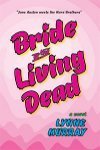Watching Our Language
 Pearlsong Press Week continues with a guest post from author
Lynne Murray
. Lynne is the author of
The Falstaff Vampire Files
Pearlsong Press Week continues with a guest post from author
Lynne Murray
. Lynne is the author of
The Falstaff Vampire Files
 ,
Bride of the Living Dead
,
Bride of the Living Dead
 and the award-winning Josephine Fuller, sleuth of size, mystery series. Her humorous essays, interviews and reviews have appeared in magazines and newspapers. She lives in San Francisco.
and the award-winning Josephine Fuller, sleuth of size, mystery series. Her humorous essays, interviews and reviews have appeared in magazines and newspapers. She lives in San Francisco.
Comment on this post for a chance to win an ebook of the Lynne Murray novel of your choice (The Falstaff Vampire Files, Bride of theLiving Dead, Larger Than Death, and Large Target are currently available in ebook form from Pearlsong Press). This offer is valid until midnight EST, Tuesday June 19, 2012.
Watching Our Language by Lynne Murray
Thanks to Zetta Brown and The Full-Bodied (Book) Blog for allowing me to rant on my favorite topic!
My own journey in writing books about people who don’t apologize for their size came when I read one fat joke too many in a novel.
Recently a friend who knows I value positive, fat characters in fiction recommended A Good American by Alex George because the two romantic leads were large. But both of us were surprised by how vehemently I hated the way the characters were described.
The book’s hero and heroine shamelessly accept their abundant flesh and engage in romantic passion without inhibition, but the author spoiled the story for me with his palpable disgust in describing the characters’ bodies. (I’ll deal with the fact that he was trying to be funny a little later.)
On page one the heroine appears, “6 feet tall, and robustly built,” walking in a fashionable public garden in Germany in the 1800s. So far, so good. The author says she “clomped briskly” down the path unlike the mincing steps of fashionable ladies of her class. Uh-oh.
The heroine moves freely, refusing to wear a corset, which is good, but the author describes her “voluminous dresses that draped her outsized form like colorful tents.” Here I seriously started to lose patience with the book.
The hero admires the heroine from afar. Determined to woo her, he hides behind a bush and greets her by singing an operatic aria with a voice “as pure and clear as a freshly struck bell.” Then the suitor emerges from the shrubbery and presses a bouquet into the heroine’s “big, sweaty” hands.
The singer is revealed to be a match for the heroine in size—even taller, and possessing “a quivering gut of heroic dimensions that he made no attempt to hide.” Note the rude slap of the word “gut” and the ironic use of “heroic,” and how the author ratchets up the prejudice with the word “quivering.”
 Allow me to demonstrate how to speak of an abundant belly without disgust. In my novel
The Falstaff Vampire Files
Allow me to demonstrate how to speak of an abundant belly without disgust. In my novel
The Falstaff Vampire Files
 , the lead character speaks about how his size has remained the same since he became a vampire:
, the lead character speaks about how his size has remained the same since he became a vampire:“The belly that I forged in life leads the way still like the prow of a ship, identical to the day I died these many—ahem! I shall not say how many centuries ago.”http://www.pearlsong.com/thefalstaffvampirefiles.htm
George managed to alienate me from his self-accepting fat characters because of his constant sarcastic comments on their bodies. Later, when the romantic duo consummate their relationship, he feels the need to suggest that they might break the bed. Really? An outright fat joke?
 Again, let me suggest that even when you have a small bed and two large people, you can be funny without sneering. Herewith from my romantic comedy,
Bride of the Living Dead
Again, let me suggest that even when you have a small bed and two large people, you can be funny without sneering. Herewith from my romantic comedy,
Bride of the Living Dead
 :
:The nearest privacy was my garage apartment on Anza. Within seconds of hitting the door we stretched out on the twin mattress and box springs formerly occupied by Mr. Yamazaki's mom. It seemed impossibly small with the two of us lying on it, the springs creaking as we wiggled around, slowly discarding one garment after another. Then we both froze when we heard a few words in Japanese spoken a few feet away. It came from the other side of the wall, of course. Oscar and I both held our breath as we heard a clatter of shoes on the garden path and a click of garden shears. The Yamazakis had come out to tend the bonsai trees just outside my window in the back yard. Maybe they heard us, and decided to give us the gardening equivalent of "Ahem, we're three feet away, we can hear you." "I don’t have any opera recordings," I whispered. Oscar started to laugh, which made me laugh. We were breathless from that and giddy from still being pressed against each other in the small bed, half undressed.http://www.pearlsong.com/brideofthelivingdead.htm
 I reassured my friend that though I disliked A Good American, I appreciated examining it. I follow French author Colette’s suggestion: “Look for a long time at what pleases you, and a longer time at what pains you.”
I reassured my friend that though I disliked A Good American, I appreciated examining it. I follow French author Colette’s suggestion: “Look for a long time at what pleases you, and a longer time at what pains you.”  Now, about George’s so-called wit in using fat-hostile language. Putdowns of fat people are so much a part of our culture that they are accepted as harmless humor just as sneers at women, Jews, gays, and people of color openly flourished in fiction several decades ago.
Now, about George’s so-called wit in using fat-hostile language. Putdowns of fat people are so much a part of our culture that they are accepted as harmless humor just as sneers at women, Jews, gays, and people of color openly flourished in fiction several decades ago. Prejudice notwithstanding, fat jokes truly are lazy writing, like any kind of knee-jerk stereotype. Note to writers: The first thing you think of invariably will be a cliché. Keep thinking, and go deeper.
 When an author puts down his characters, it diminishes them, the readers and the story.
When an author puts down his characters, it diminishes them, the readers and the story.
Published on June 13, 2012 06:00
No comments have been added yet.



